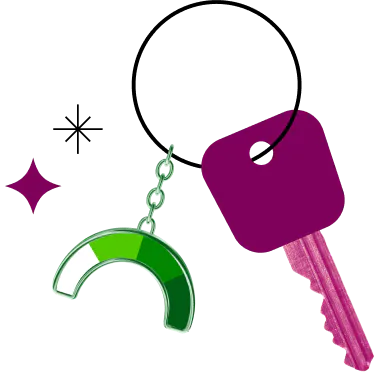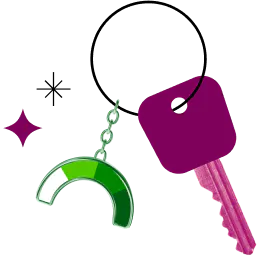

Know what great scores on your credit reports could get you

Building credit
Learn how to achieve your financial goals with our personalized tips and tools.

Know the factors
Get a breakdown of the six factors that make up your credit scores.

Get the right tools
Choose from credit card and loan options that could work best for your financial needs.
Editorial Note: Intuit Credit Karma receives compensation from third-party advertisers, but that doesn’t affect our editors’ opinions. Our third-party advertisers don’t review, approve or endorse our editorial content. Information about financial products not offered on Credit Karma is collected independently. Our content is accurate to the best of our knowledge when posted.What is a good credit score?
Updated June 20, 2021
This date may not reflect recent changes in individual terms.
Written by: Casey Hollis
There’s no one definition of a good credit score. That’s because there are several different credit scores that depend on different scoring models with different score ranges, and different lenders have their own standards for rating credit scores.
That being said, scores starting in the high 600s and up to the mid-700s (on a scale of 300 to 850) are generally considered to be good.
How a good credit score can help you
A credit score is a numeric representation, based on the information in your credit reports, of how “risky” you are as a borrower. In other words, it tells lenders how likely you are to pay back the amount you take on as debt.
Credit scores are one piece of the puzzle that lenders look at to determine whether or not to lend to you. A good credit score can help you get access to a greater variety of loan offers. And if a lender approves your application for credit, a good or excellent credit score can help you qualify for lower interest rates and better terms.
In general, the higher your scores, the better your chances of getting approved for loans with more-favorable terms, including lower interest rates and fees. And this can mean significant savings over the life of the loan.
Having a good score doesn’t necessarily mean you’ll be approved for credit or get the lowest interest rates though, as lenders consider other factors, too. But understanding your credit scores could help you decide which offers to apply for — or how to work on your credit before applying.
Credit score ranges
There are many different credit-scoring models, and each one uses a unique formula to calculate credit scores based on the information in your credit reports. Even the best-known credit-scoring companies, FICO and VantageScore, have multiple credit-scoring models that produce different scores. (Credit Karma offers free VantageScore 3.0 credit scores from Equifax and TransUnion.)
But while there are many different credit scores, the most common models all use a scale ranging from 300 to 850. Within this scale, there are some general credit score ranges that can help you interpret what your scores mean.
Here are the credit score ranges to be aware of and what they mean for you.
How good should my credit scores be …
FAQs
How do I get a good credit score?
Building a good credit score can take time. Here are some general practices we recommend that can help you stay on the right track.
- Check your reports. Knowing your scores and being aware of what’s on your credit reports is the first step to working on your credit. You can check your credit reports from Equifax and TransUnion for free on Credit Karma. Credit Karma also offers free credit monitoring.
- Pay on time. Your payment history is a major factor in your credit scores.
- Pay in full. Keeping your credit card balances low can not only save you money on interest, but can also help keep your credit utilization rate down. Your credit utilization rate is how much of your available credit you’re using. A good rule of thumb is to keep it below 30% of your total credit limit.
- Don’t close old credit accounts. A longer credit history can help increase your credit scores by showing that you understand credit and have been using it for a long time. Keeping your oldest accounts open can ensure that your overall credit history continues to age.
- Consider your credit mix. Your credit mix reflects the different types of credit you have on your reports, from credit cards to student loans. We don’t recommend applying for a loan just to get another type of credit account on your reports, but it’s good to know that this can factor into your scores.
Read more about the factors that affect your credit scores.
How long does it take to get a good credit score?
It depends on where you’re starting from and what challenges you’re facing. But building good credit probably won’t happen overnight.
If you’re brand new to credit, it could take months of using beginner products like secured cards to make significant progress in the types of financial products you qualify for. If you have dings on your credit reports, like late or missed payments or a bankruptcy, it could take years for those derogatory marks to fall off and stop affecting your scores.
But even if you have years left before those derogatory marks officially fall off, you can still see significant progress. The important thing is to work steadily toward getting your credit in good shape and understand that building credit is a journey.
How do I find out what my credit scores are?
You can get your scores from Equifax and TransUnion for free on Credit Karma. Checking your own scores won’t hurt your credit. And you’re entitled to free credit reports from Equifax and TransUnion each year with details about important credit factors so that it’s easy to track your progress.
Learn what your score means: 700 710 720 730 740









